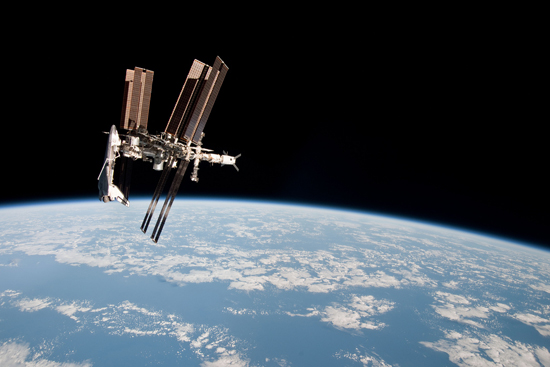Whither NASA?
BU profs weigh in on agency’s post-shuttle purpose

The Space Station (above) is in orbit, but the Space Shuttle has been scrapped, so what’s NASA to do next? Photo courtesy of NASA. Photos below by David Bradford and Vernon Doucette
When it absolutely, positively has to get there overnight—and when “there” is in outer space—you might try Moon Express. The Silicon Valley start-up hopes to be, in the words of the New York Times, the “future Federal Express for moon deliveries.” Moon Express bought its prototype vehicle from NASA, which will face private competition now that its 30-year-old Space Shuttle program has ended. And Moon Express is among dozens of companies angling for the $30 million that Google has offered to the first company to manage a lunar landing.
The shuttle’s demise and the private race to space raise the question of what NASA should do next. At BU, that question is more than academic, because researchers here received $4.4 million in grants from NASA in fiscal year 2011. Most of the money went to four entities: the College of Arts & Sciences geography and environment and astronomy departments; the Center for Space Physics; and the Institute for Astrophysical Research.
President Obama, for one, has proposed that the space agency rocket humans to an asteroid and into Mars orbit. BU Today asked some professors around the University who’ve done NASA work for their views. Their suggestions range far and wide, figuratively and literally, from boldly going where no one has gone before to focusing NASA’s eye on a place we’ve all been: Mother Earth.

Paul Withers
Assistant professor of astronomy at the College of Arts & Sciences and the Center for Space Physics
NASA’s main mission should be the broad-based exploration of space, near and far. It should encompass humans traveling through space, robots voyaging to other planets, and farseeing telescopes watching distant galaxies. However, NASA’s activities will remain unsettled until the next generation of spaceships is reliably carrying humans into space.
The destination for those astronauts is not, in my view, terribly important. What matters is that a true commercial space transportation system arises: some means of moving people and cargo from Earth’s surface to orbit 100 kilometers above our heads that operates routinely, reliably, and inexpensively, and whose customers are not just the U.S. government. That’s why I’m so excited by the recent achievements of entrepreneurial companies like SpaceX and Virgin Galactic. If, and it’s a big if, they can make money going into space much more frequently than the Space Shuttle’s fastest pace of nine launches per year, then we might soon see the barriers that currently impede access to space drop dramatically.
Once it becomes significantly easier to send rockets into space, then all kinds of space exploration will really accelerate humans’ traveling beyond low-Earth orbit to a range of destinations, fleets of satellites spreading out over our entire solar system and beyond, and legions of sentinels vigilantly surveying the sun, stars, and galaxies.

Mark Friedl
Professor of geography and environment at CAS and the Center for Remote Sensing
For me, the answer to this question is straightforward. Throughout human history, and in particular over the last 150 years, humans have transformed the Earth. Most people think of climate change and global warming. However, what many don’t appreciate is how dramatically and rapidly humans have affected nearly every aspect of the Earth system; in addition to changing the greenhouse gas composition of the atmosphere, human activity has led to enormous changes in the Earth’s biosphere, cryosphere, and oceans.
NASA has the capacity to contribute solutions to the pressing environmental issues that confront society. If NASA fails to take up this challenge, the global change science and policy community will lose one of its most important tools.
To better understand how our planet has changed, how it might change in the future, and what the implications of these changes are for society, high-quality Earth observations acquired from spaced-based platforms are essential. Data collection networks on the ground, in the atmosphere, or in oceans provide an important and complementary basis for global change science. However, satellites provide a unique and powerful vantage point for studying how our planet functions and how it is changing. For the last 40 years, NASA has led the world in satellite-based Earth observations and systems science. NASA continues to have unique capabilities and expertise in this domain, but resources at NASA supporting this mission are stretched thin, and the agency can and should do more to maintain its leadership in global change science.
Through greater investment in satellite technology, instrumentation, and basic research, NASA has the capacity to not only improve how we study and understand our planet, but to contribute solutions to the very real and pressing environmental issues that confront society. If NASA fails to take up this challenge, the global change science and policy community will lose one of its most important tools. NASA needs to rediscover and reinvigorate its “mission to planet Earth.”

Joshua Semeter (ENG’92,’97)
College of Engineering associate professor of electrical and computer engineering; former director of the Center for Space Physics
With each new administration, NASA faces a reset button. In scrapping NASA’s current manned spaceflight program (the Constellation program), President Obama has made a defensible call. After six years and $10 billion, the cost and timeline of Constellation remain rapidly moving targets. It is time to try something different.
The NASA scrap yard is filled with programs that failed to ignite before the next administration. This is a feature of our democracy, but utterly confounding for a manned space program, which requires a development timeline that far exceeds a two-term presidency. There are two solutions that offer some immunity to government whim: international consortia and the private sector.
NASA was formed in response to the Soviet space program, but manned space travel beyond the moon cannot be approached as an American venture. Star Trek had it right. This must be a planetary venture with a multinational crew manning the bridge. A hundred years from now, the Cold War motivations that drove us to the moon will seem quaint.
Is space travel profitable? Going into space is at least as entertaining as going to Disney World, and that enterprise is quite profitable. If the price point drops, space travel could easily become the vacation du jour.
BU is very active in space science and space engineering. Space exploration has an inherent seduction that is difficult to match. Designing a computer chip may be of interest to our engineering students, but designing a chip that will orbit the Earth elevates student motivation to new heights. Manned space exploration is both irrational and irresistible. It rests on the dispassionate principles of engineering and physics, but excites the imagination deeply. It embraces the very definition of what it is to be human. This should remain as NASA’s central objective.

Comments & Discussion
Boston University moderates comments to facilitate an informed, substantive, civil conversation. Abusive, profane, self-promotional, misleading, incoherent or off-topic comments will be rejected. Moderators are staffed during regular business hours (EST) and can only accept comments written in English. Statistics or facts must include a citation or a link to the citation.